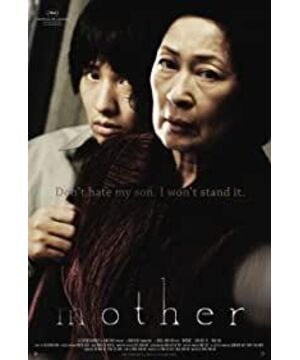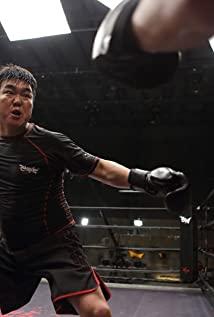When the persistent mother's love meets the trick of fate... Sad, speechless, helpless.
Carrying a sinful body, he had to live for his mentally handicapped son. Just let yourself pretend to forget the past and let yourself be tortured by guilt.
=================
(The above was posted 20 minutes ago, but when I was washing the pots and pans, I thought about it a lot, and I felt sorry for the director if I didn't write it out, yes The judges who can't stop choosing him to be nominated for the Oscar. I believe that thoughtful directors are still eager to be read and understood more.)
This film has caused a lot of thinking.
I didn't get much interest until I saw half of it. I have always been disgusted with movies that use the life of some mentally handicapped people to earn the curiosity of ordinary people. You can compare the two films when you have time. However, this film begins with the excavation of the deceased's life, conflicts, twists and turns, and accidents are presented as heart-wrenching as peeling an onion. The first feedback after reading it is thinking about maternal love. However, after further chewing, I can't help but ask myself, is this movie really just about mother love? The answer is of course no. In the aftertaste of just over ten minutes, in the sound of pots and pans colliding, in the sound of running water, and in the sound of rubbing the bottom of the pot, countless images worth thinking have poured into my mind. Maternal love, this eternal topic that is great and profound but has been interpreted in countless ways, is actually just a beautiful leather robe used to cover up the sharp portrayal of the dark side of society. The twists and turns of the plot and the unexpected ending are just leather robes. On the precious mink collar. The real message that the director wants to convey is the little one hidden under the leather robe.
This film actually reflects some deformities of the lower-class society in Korea. (This term is often used at the end of the text, I don't know if it is appropriate here. After all, it is not often written and explored deep topics)
The first is the numbness of Korean teenagers to the passing of life. The disappearance of one of their classmates, or even their best friend, didn't seem to have touched them at all. The only thing that is active is the excavation of the deceased's sexual affairs and the efforts to cover up the possible exposure of their own scandals. Look at the broad smile of the bar girl waving her hand at her detained son on the roof amid the crowd. It's like a murder scene investigation, more like meeting an old favorite boy at a party.
Second, the tragic death of a young girl in the flower season failed to cause a slight disturbance in this remote small mountain village. We don't have to ask why a teenage girl who has lost her parents and is caring for an elderly grandma needs to make ends meet through the cheap sex trade. Interestingly, if the act involved receiving money as a reward, the school would intervene and result in expulsion. In exchange for rice cakes, no one cares. Is this widely known fact so common that it is difficult for society to help and care for vulnerable groups? Can we simply blame the schoolgirl for depravity?
Third, the incompetence and negligence of the local police need not be mentioned. It is too obvious to play with duty and to close the murder case, which of course reflects not only the failure of the individual but also the failure of the system.
Last, but certainly not least, is the complexity of human nature. Two interesting characters: Silly Son's good friend and the old scavenger. This friend is a typical mixture of contradictions. From the perspective of traditional ethics, a typical hooligan seduces underage girls for a long time. But he did his due diligence in asking this mother for help, and was worthy of the cash he received. In our traditional view, it is unacceptable for a person to take money for helping a friend's mother to wash away a friend's grievances. The same old scavenger, hearing that he thinks the real murderer may be released, who is indignant to call the police, looks so righteous, but instead thinks that he is also an old hooligan who participates in cheap sex for girls, which is complicated. Again hesitant. Who can say that his eyewitness statement is not a lie? Could it be that he raped and killed the girl and then planted the blame on the mentally handicapped son? People's trust is based on positive value judgments. For such an old hooligan who has lost his ethics, how can he trust the authenticity and reliability of his words? In fact, such suspicion also casts a layer of uncertainty about the real murderer in the film.
However, sadly, no matter what the facts are, this mother committed the unforgivable sin of destroying other people's lives under the selfish impulse to protect her son. Sadly, the mentally handicapped son found out, how unbearable and struggling this is. , how will she face the days ahead? This series of questions about human nature, society, and maternal love constitute the deep structure of the film. It is doomed that it is not a trivial and simple statement.
View more about Mother reviews











